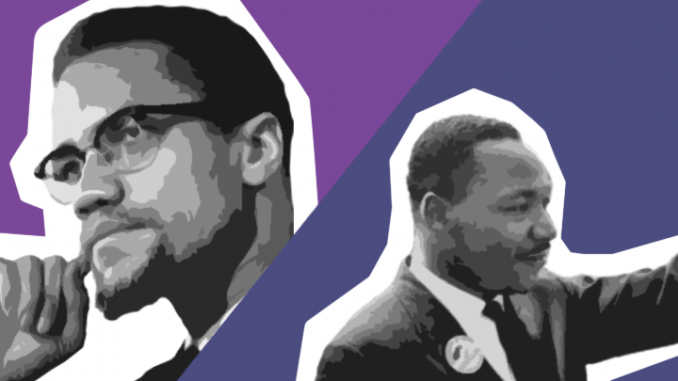
Rev. Martin Luther King Jr. Day has been a federal holiday since 1983 when — despite the objection of 22 senators — the United States Congress voted to establish a day to honor the African-American icon, the New York Times reported.
Malcolm X Day is currently a holiday in Illinois and Berkeley, California. Attempts to establish it at a national level failed in the 1990s, the Chicago Monitor reported.
The two civil rights activists met only once, according to Biography.com, but Temple students and faculty continue to discuss and draw lessons from King and Malcolm X’s different approaches to ending racism.
“Malcolm X is more frowned upon, whereas [King] is taught in history,” said Tranae Fee, a senior kinesiology major and a member of Temple’s Black Student Union. “I think perception is the reason why we have a federal day for one and not for the other.”
Molefi Kete Asante, chair of Temple’s Africology and African American Studies department, said King and Malcolm X had shared ideas.
“The principle unity between Malcolm X and [King] is that they believed white domination and racism were the chief issues of American society,” Asante said. “[King] was the preeminent mass leader of the last half of the 20th century in the African American community.”
Both King and Malcolm X placed a high value on Black self-respect. In a 1968 essay published in LOOK magazine, King denounced the American economic system as an instrument of oppression that negated the worth of Black people. Malcolm X wrote in his autobiography that “the true problem” is that Black people are not respected “as human beings.”
But Malcolm X criticized King for his non-violent approach to combating racism and argued that injustice would not be solved this way, Al Jazeera reported.
From the beginning, the American establishment media — at the time, almost entirely white, according to USA Today — took a side in the argument. A 1964 editorial from the New York Times described Malcolm X as an “embittered racist” and an “irresponsible demagogue.”
The divide in the way the two figures are discussed extends beyond the United States, a student said.
“In the [U.S.], my friends often say they had a chance to talk about King but not Malcolm,” said Mayuko Abe, a junior Africology and neuroscience major from Japan. “In Japan, I had to learn about King in middle and high school, but not Malcolm X.”
Abe said this may have been due to the perception that Malcolm X was seen as instigating violence.
“[King and Malcolm X] felt that they had to devise a strategy. One was non-violent, one was more militant, but you couldn’t call it violent, because he never attacked anyone,” Asante said. “You could call it resistance.”
King’s response to American racism, outlined in a speech to the Hunger Club republished by The Atlantic, was to disrupt the system — through boycotts, strikes and marches — in order to transform it.
Today, more than 50 years after King’s death, people continue to search for ways to combat racism. For some Temple students and activists, Malcolm X has become a touchstone for a reason.
“Malcolm X, coming as he did from the urban north, and the prison system of the U.S., took the path of an alternative,” Asante said. “He demonstrated in his rhetoric and his leadership a distinct northeastern or urban approach to the crisis in the black community. Whereas King was more Southern, agrarian-leaning, in his impressive moral presence, there was a cutting edge to Malcolm.”
Both figures’ views may have been a result of their respective experiences and environments, Asante said.
“More radical views take place in situations where people feel like the oppression is more strenuous,” he added. “Wherever you have these conditions you have reactions to them.”
The two men are seen in opposite lights by some Temple students.
“I would say that I think some think Malcolm is more radical, but a lot of people our age, that’s what we align with,” said McKenzie Morrissey, a sophomore public health major and a member of BSU. “Young people are convinced the old ways aren’t working and Malcolm X did things differently. I feel like the Black Panther movement, that’s the era we’re in. People see it as a trend, although it’s bigger than that.”
The Black Panther Party was a pro-Black political party founded in 1966 in the wake of Malcolm X’s assassination. They are known for their armed patrols of Black neighborhoods and militant response to police brutality, according to History.com. The Black Panther Party, as well as some modern Black liberation and leftist groups, were inspired by Malcolm X’s call for “freedom, by any means necessary.”
Asante said the widespread influence of Malcolm X’s ideas shows how the official narrative of the civil rights era isn’t the only one.
“History is written in two different places, by the state, there are symbols approved by the state and those approved of by the people,” Asante said. “[King] has become in one sense the establishment icon, but [Malcolm X] is deeply rooted in the hearts of the community.”


Be the first to comment